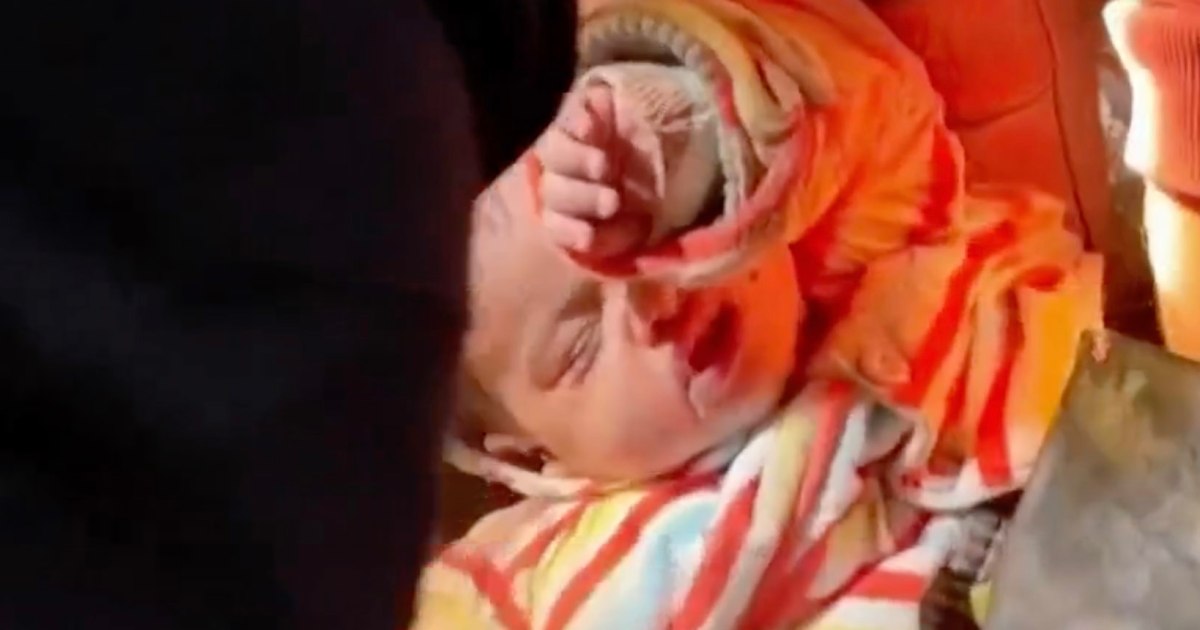
TEL AVIV — In the Gaza darkness, an airstrike rips through Rafah, where Palestinians from across the Gaza Strip are seeking refuge.
The chaotic aftermath plays out like so many devastating scenes from the Israel-Hamas war so far: Buildings are leveled into piles of smoldering rubble. Neighbors dig with their bare hands searching for survivors. The dead and wounded are frantically ferried away.
But this time, covered by a mattress and trapped by debris, a child is found. She’s just 10 months old, and her name is Tala Rouqah.
NBC News’ team in Gaza witnessed her dramatic rescue on Thursday night, when the Hamas-run Palestinian Health Ministry said more than 20 were killed in an Israeli airstrike in Rafah, in southern Gaza, now a major focus of Israel’s military campaign.
Israel’s military hasn’t said what it was targeting, but has said its bombing campaign is designed to dismantle Hamas’ military abilities and rescue Hamas-held hostages.
When Tala is discovered, she is unconscious, but breathing. Volunteers who show up to rescue her chant, “She’s alive, she’s alive” in Arabic.
Protruding from broken concrete just inches from Tala is her mother’s hand. The rest of her mother is submerged in the rubble.
And just a few feet away is Tala’s father, Ahmad Rouqah, also trapped in the wreckage. With the help of rescuers, he is freed, and ecstatic chants ring out from the men who freed him.
Seconds later, baby Tala is freed, too, and carried to the nearby Kuwaiti Hospital by a neighbor.
The next morning, Ahmad is recovering in a different hospital, where he recalls the moments before the strike.
He says the family had fled their home in Gaza City at Israel’s direction to Khan Younis, the largest city in the south, where they stayed with relatives until civilians in that city, too, were told to evacuate. They fled to Rafah, seeking refuge in a house they said had been abandoned and left vacant for several years.
He says they had just finished worshipping during the evening call to prayer and the women of the family were preparing dinner when the building was struck.
“Why, and for what? Only God knows,” Ahmad tells NBC News in Arabic. He says that nobody in his family was part of what he calls the resistance, a reference to Hamas.
Ahmad takes stock of his loss: His mother and wife have both been killed, he says. His son and another daughter, too. And three of his brothers, and his brother-in-law. In all, he says, at least 10 relatives lost their lives.
“Oh god, help me in my misfortune and bring good from it,” he says. “May god accept them in heaven.”
Rapped by grief, Ahmad has yet to see his daughter, until a cousin collects her from the nearby tent city where she’s being cared for and cradles her in his arms. Tala’s leg is broken and in a cast, but she appears otherwise in generally good condition.
Her cousin brings her to Ahmad’s bedside, where the baby breaks into tears when she sees her father — a mix of agony and relief.
He tries to sit up, but is visibly in pain from his injuries. Young Tala is placed in his arms.
She clings to his chest and is soothed, while her father gently sobs. Father and daughter begin the long journey ahead, as the surviving members of a family united by grief.
“Where is your brother, and sister,” he says. “There’s no one left for us.”






